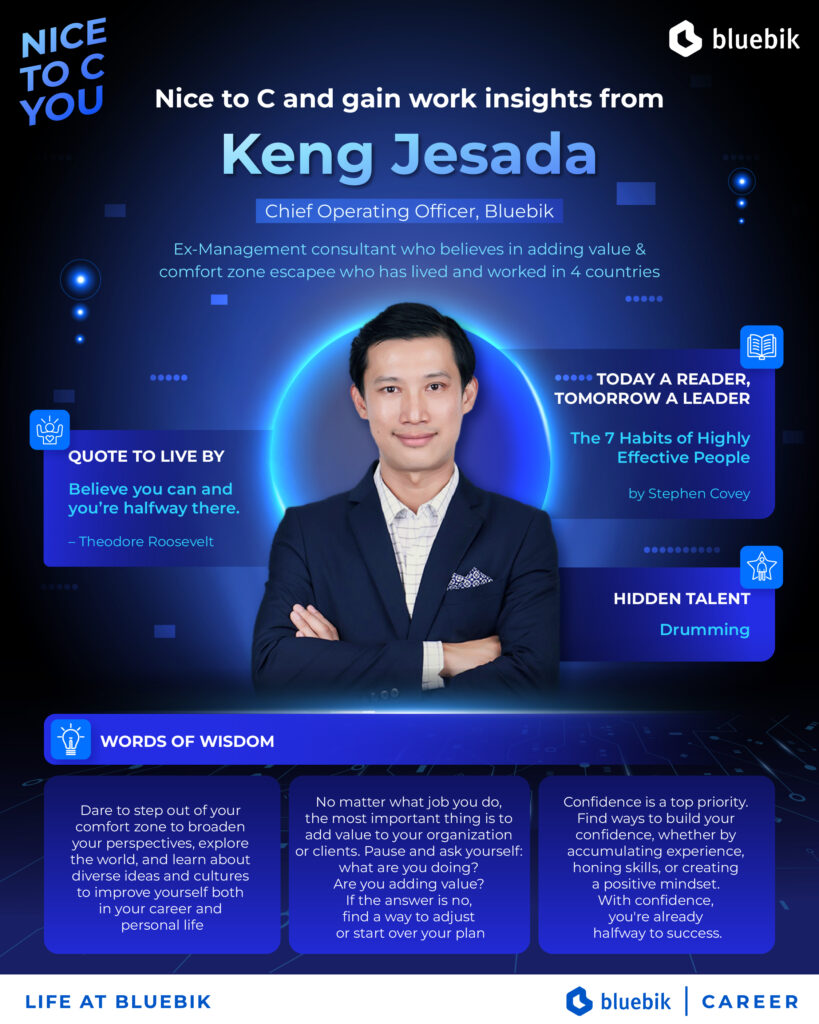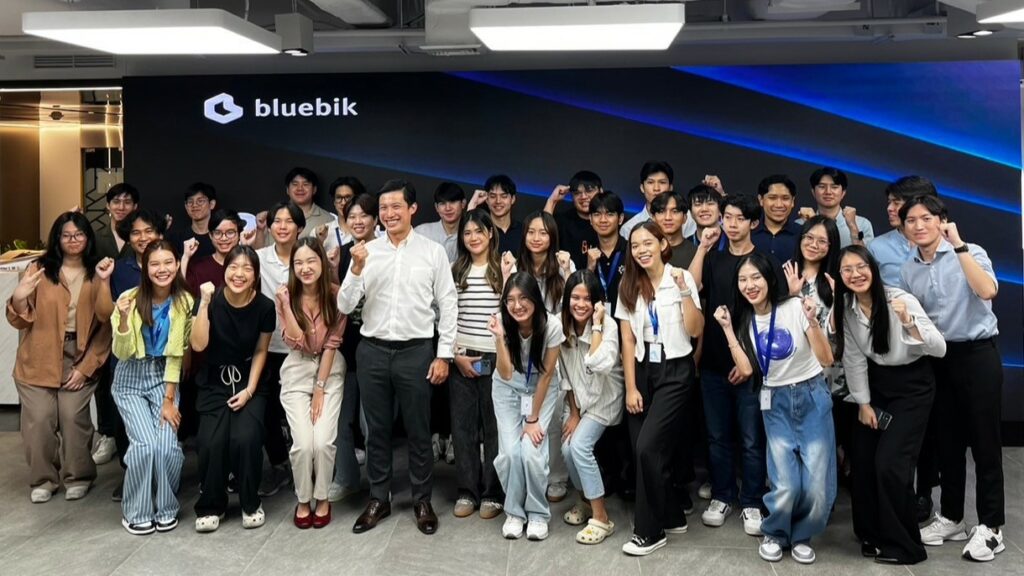The more you see the world, the broader your horizon becomes.
This is the conclusion we come to after talking with Jesada “Keng” Tanrattanakul, Chief Operating Officer of Bluebik.
Keng has broadened his horizons by going to the United States during high school, furthering his business management knowledge during his master’s studies in the United Kingdom, and returning to help global clients enhance their competitiveness as a management consultant at leading consulting firms in Thailand. He then took on the challenge of overseeing the entire production process of the largest stationery factory in the world and served as CEO for one of the pioneering telemedicine startups in Indonesia.
The cumulative experience from studying, working, and living in 4 countries has equipped Keng with a broad perspective, allowing him to compare similarities and differences to select the best aspects from each country to add value to the clients.
Now that Keng has stepped up as Chief Operating Officer at Bluebik, we would like everyone to get to know him better and learn from the insights he shares with us.

First Step out of the Comfort Zone in the United States
Even though he couldn’t speak English and had never lived independently, when the young man from Chiang Mai saw the opportunity to step out of his comfort zone for the first time, he didn’t hesitate to take the leap.
The leap involved traveling across the globe to study high school in the town of Gering, Nebraska, USA.
“I was in the middle of nowhere. Gering is a small town with less than 10,000 people. At school I was the only exchange student from Asia who couldn’t speak English at all. The first two months were very stressful. Some nights I wanted to scream but didn’t want anyone to hear, so I screamed softly into my pillow. It was a very dark time, but once I started dreaming in English, I found myself enjoying the new cultures very much.
“Studying in the US taught me to live independently and I truly immersed myself in their culture. As it was such a small town, they had their own community and frequently organized activities. I joined many of their activities such as church activities. The school also had many activities, in which I participated because I thought I was there for a short time, so I needed to make the most of it.
“At the time, I realized that if I really want to see the world, I need to go out, engage in activities, and meet new people.”
And believe it or not – even though Keng was very active in extracurricular activities, being in the marching band, performing in musical theater, and competing in speech contests, his GPA was 4.00!
Discovering Passion in Business Management While Studying in Thailand and the UK
After returning from America, Keng decided to study business for his bachelor’s degree at Assumption University before pursuing a master’s degree in business at the London School of Economics and Political Science.
Even in university, Keng’s life philosophy remained the same: study hard and participate in activities even harder. This is evidenced by graduating with first-class honors for his bachelor’s degree and a distinction for his master’s degree, alongside countless business case competitions.
Keng defines studying business as something “close to home.”
“When I was young, my family ran a business selling recycled goods. They bought scrap paper, bottles, and aluminum, shredded them, and compressed them into bales before sending them to factories. My family were hustlers; home and the factory were the same place. I saw this every day: buying, selling, adding value, reducing costs while increasing efficiency. Sometimes I liked lying on big piles of paper (laughs). It felt comfortable. I really grew from that business.”
“At first, I wasn’t sure what I wanted to do. As a kid, I wanted to be a scientist. Later, when I liked playing drums, I wanted to be a musician. But when it was time to choose a major, I wanted to keep my options open in case I discovered my true passion, so I chose to study business. It turned out to be very close to home. The content was tangible, with theories and frameworks to use, not too abstract. I thought about how to apply theories in the real world, and whether I could do it well. During my studies, I competed in many business competitions, and seeing that if you study hard and apply the theories, you get feedback that helps you improve, making it even more enjoyable and successful.”
Living in Thailand but Making Changes in Many Countries
Before graduating, Keng set his goal on becoming a management consultant because it is a job that requires a balance of both soft and hard skills.
Of course, Keng achieved his goal, working as a management consultant for almost ten years at leading consulting firms in Thailand, including Accenture, L.E.K. Consulting, and BCG (where he also met Pochara “Boat” Arayakarnkul, our CEO).
Keng’s experience as a management consultant was rich and flavorful. All management consultants at Bluebik would surely nod in understanding, from working tirelessly to meet deadlines, jumping into various industries, the challenge of analyzing problems and finding solutions for clients, and much more.
“These flavors made me feel that time passed very quickly. Over nearly ten years, I really grew a lot,” Keng recounted.
“The key takeaway is that we, management consultants, need to be thought partners for our clients. Clients are willing to pay us a lot because they want value from us. That value is not just being a rubber stamp to confirm their ideas. For me, that’s not real value. Real value is delivering something that can be truly implemented, not just selling dreams. We need to walk the talk. When the project ends, the client implements our strategy and sees real changes. By doing this repeatedly, they come to know us as true advisors they can trust in any situation. If they have a problem or need help in a certain area, they know who to call because they know they’ll get answers and trust.”
During his nearly ten-year tenure as a Management Consultant, Keng worked on over 100 cases across almost every industry and function, gaining the opportunity to collaborate with clients from various countries. The last client he helped strategize for was the key factor that pushed him out of his comfort zone once more.
That client was one of the largest and most influential conglomerates in Indonesia.
Rolling Up His Sleeves and Getting Ready to Rock in Indonesia
Despite being a passionate management consultant, Keng always had one question at the back of his mind, “I believe every consultant has this question: are we really adding value to the client?”
Coincidentally, after closing a project, the client recruited Keng to work in Indonesia. After careful consideration, Keng decided to accept this new challenge and work within a business organization.
“I thought if I didn’t take the leap now, I might not get another chance. I wanted to try being hands-on as an executive in a business organization. If I had an idea, I wanted to test it out to see if it worked. Sometimes, as a consultant, I said things were easy and doable, but I wanted to know if I could actually do it.”
The company Keng worked for was in a conglomerate with footprints in various industries. Keng’s first role was Head of Operations at the Asia Pulp & Paper factory in Surabaya, the largest stationery factory in the world. There, he immersed himself in understanding and improving processes. Later, he moved on to become the Head of Strategy for the Consumer Business Unit.
After that, Keng switched industries again to work in healthcare, co-founding SehatQ, a telemedicine startup connecting patients with hospitals, clinics, and pharmacies through an online platform. Keng started off as the Head of Platform, overseeing all aspects, before being promoted to CEO.
Even though these new roles were highly challenging with everything being new – new industries, new responsibilities, new country – Keng said he tackled it with confidence, which has been built from years as a management consultant.
“When switching industries, people’s first fear is whether they can speak the same language or manage a team with deeper expertise. These things can undermine confidence. I faced this many times as a management consultant. It made me realize that I have other skills to add value, including people management, problem identification and solution development, and having frameworks to solve problems.
“But that doesn’t mean I shouldn’t learn technical or industry-specific jargon quickly. I need to learn fast and create significant changes quickly. However, I should not assert authority without understanding first. That would be a misstep,” Keng concluded.
The More You See the World, the More You Can Apply Knowledge Effectively
In addition to his quick learning and problem-solving skills from his time as a Management Consultant, another crucial factor that helped Keng adapt to new roles quickly was his experience of seeing the world and immersing himself in diverse cultures.
“For example, when working at Asia Pulp & Paper, I noticed that Thailand has only a few copy paper brands, but in Indonesia, there are hundreds. I thought something needed to be done because having so many brands leads to increased marketing costs, production costs, inventory complications, and different channels to promote them. Experiencing different parts of the world allowed me to use one point of reference and apply it to another. I didn’t need to be an industrial engineer or understand machinery, but I could still add value.
“Opening up to new cultures has taught me that diversity is a valuable asset. It allows us to view the world and address problems from various perspectives. When discussing cultural diversity in organizations, I encourage exploring many places and not limiting ourselves to just one country. While we may develop best practices, opening our minds and learning from the experiences of other countries can teach us many new things. This concept goes beyond cultural diversity; it includes people with different ways of thinking and backgrounds. We can learn a lot from each other. So, I encourage you to keep an open mind and broaden your perspective.”
Returning to Thailand with an Important Mission at Bluebik
After living in Indonesia for about eight years, Keng felt it was time for a change. He also wanted his children to grow up in Thai culture, so he decided to move back to Thailand. During his career break to reflect and plan his next steps, he happened to meet Boat at a friend’s wedding. “And the rest is history,” Keng said with a smile.
“I think it was serendipity. My life came full circle. I started as a consultant, then moved to management roles in business organizations, which helped me understand what I wanted, what I did right, and what I did wrong. This has made me a better consultant because I can use perspectives and experiences from both sides, as a consultant and a client, making my advice more substantial.”
As the Chief Operating Officer at Bluebik, Keng oversees many areas. Simply put, he is here to ensure the quality of Bluebik, both in terms of projects and people.
“For projects, it’s about how we execute them and maintain the quality of execution. For people, since the quality of a service organization depends on its people, it’s about providing them with the right resources, motivating them, and ensuring they deliver gold-quality work.”
Keng views Bluebik as a rapidly growing company filled with specialists. However, as someone who wants to help Bluebik grow continuously, he notes, “What made us successful in the past might not necessarily ensure our future success.”
He explains further, “Of course, we need to maintain our quality of work and keep the clients who have supported us. But we shouldn’t limit ourselves to our comfort zone. Currently, we offer multiple services within the digital transformation umbrella. In the future, I believe we can go much further. We can even create products from our services. We can demonstrate why our products are better than off-the-shelf ones and have a team ready to tailor solutions to specific clients’ requirements.”
In Keng’s view, Bluebik will grow exponentially in the future. “We will be a global firm with footprints in multiple locations. Our team will expand, and in terms of expertise, we will have specialists in every field.”
This is the story and vision of Keng, the Chief Operating Officer who will strengthen Bluebik and help us grow further than ever before.
If you see Keng at the office, don’t hesitate to say hi. He is always ready to share his experiences and ideas one-on-one!

3 Work Insights from Keng COO
1. Dare to step out of your comfort zone to broaden your perspectives, explore the world, and learn about diverse ideas and cultures to improve yourself both in your career and personal life
2. No matter what job you do, the most important thing is to add value to your organization or clients. Pause and ask yourself: what are you doing? Are you adding value? If the answer is no, find a way to adjust or start over your plan
3. Confidence is a top priority. Find ways to build your confidence, whether by accumulating experience, honing skills, or creating a positive mindset. With confidence, you’re already halfway to success.
5 Fun Facts to Know Keng COO Better
1. His favorite Indonesian word is…
“Bisa,” which means “can.” In whatever situation, I always say, “Bisa, bisa!” (laughs).”
2. The dish he misses the most when abroad is…
“Mee Krob Rad Na Moo (crispy noodle with pork gravy) from a now-closed restaurant in Chiang Mai (laughs). I can’t have it anymore.”
3. On weekends, you can find Keng at…
“A kid cafe. I like taking my kids out. We change the location every week.”
4. His favorite song to play on the drums is…
“Metropolis by Dream Theater. It’s a very challenging song, not just for drums, but for every instrument. Everything must be synchronized so the band practiced it day and night.”
5. If he could go back in time and talk to his 20-year-old self, he would say…
“Go be a musician. Don’t become a consultant. Life isn’t as easy as you think” (laughs).”




